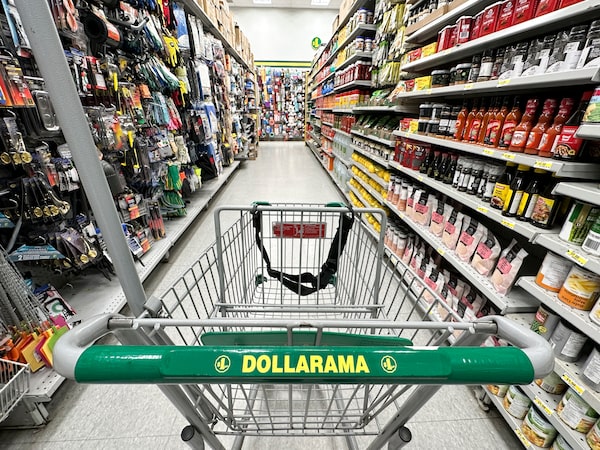
A shopping cart in an aisle of a Dollarama store in Montreal, on June 7, 2023. Comparable store sales are expected to increase by a range of 3.5 to 4.5 per cent, according to the company.Christinne Muschi/The Canadian Press
Dollarama Inc. DOL-T reported a 24-per-cent annual increase in profit in the fourth quarter, as Canadians feeling the sting of inflation continue to visit discount retailers to purchase everyday necessities such as food, cleaning products and personal-care items.
The Montreal-based company also boosted its quarterly dividend by 29.9 per cent, to 9.2 cents a common share.
While people are buying fewer items during each trip to Dollarama, they are shopping there more frequently, partly because they are looking for lower prices on those everyday necessities, which the company refers to as “consumables.” This has been a continuing trend over the past two years as prices have risen and people have looked for ways to cut back.
And while Dollarama executives are expecting these trends to normalize throughout the course of this year, the company is forecasting continued strong demand in the months ahead. Comparable store sales – an important metric that tracks sales growth not tied to opening new locations – are expected to increase by a range of 3.5 to 4.5 per cent, according to the company.
“We are setting a high bar on a key retail metric, over and above two years of exceptional double-digit same-store sales growth,” chief executive officer Neil Rossy said on a conference call Thursday to discuss the results. Market surveys have shown that the uptick in traffic is coming from across the economic spectrum, including lower-income households and those with annual incomes above $100,000, Mr. Rossy added.
Dollarama’s comparable store sales grew by 8.7 per cent in the quarter ended Jan. 28. That was compared to the previous year, when the company reported growth of 15.9 per cent. For the full year, comparable sales were up 12 per cent compared to the year before, as store visits increased.
“We continue to see strong consumer demand,” chief financial officer Patrick Bui said on the call.
Dollarama reported net earnings of $323.8-million, or $1.15 a share, in the fourth quarter, compared to $261.3-million, or 91 cents a share, in the same period the prior year. Total sales grew by 11.3 per cent to $1.6-billion in the quarter.
One way retailers attract continued store traffic is by offering shoppers incentives through loyalty programs – an area where others in the industry have noted increased activity as people pay for purchases with points in order to save money.
Last summer, the Air Miles reward program, owned by Bank of Montreal BMO-T, announced a limited-time partnership with Dollarama, allowing Air Miles Mastercard holders to earn points on purchases there. The partnership was extended beyond the initial three-month period, but on Thursday’s call Dollarama executives declined to say whether it had been extended again. Mr. Bui said it was a pilot project and that it was “too early” to provide information on how the test had informed management’s thinking about loyalty initiatives.
Like all retailers, during this uncertain economic time Dollarama has also observed an uptick in “shrink,” an industry term that often refers to merchandise that is stolen. Shrink can also refer to other reasons products can’t be sold, such as damage during shipping, or spoilage.
Dollarama is implementing strategies to combat the problem, including investigating the role self-checkouts might be playing, Mr. Bui said during Thursday’s call. He added that managing shrink is a “high priority” for the company, but declined to give any further details on those initiatives.
The cost of shipping products into the country has continued to decline from its pandemic peaks, helping to expand Dollarama’s gross profit margin to 46.3 per cent of sales, compared to 44.6 per cent in the prior year. The company also reported its logistics costs were lower, though the cost of store labour is going up.
For the full year ended Jan. 28, Dollarama’s sales increased by 16.1 per cent to nearly $5.9-billion. The company opened 65 new stores in Canada over the course of the year, increasing its total to 1,551 locations. Dollarama plans to maintain its pace of expansion, opening 60 to 70 additional stores this year, and has a long-term goal of operating 2,000 stores in Canada by 2031.
The company reported $1-billion in net earnings for the full year, or $3.57 a share, compared to $801.9-million, or $2.77 a share, in the prior year.